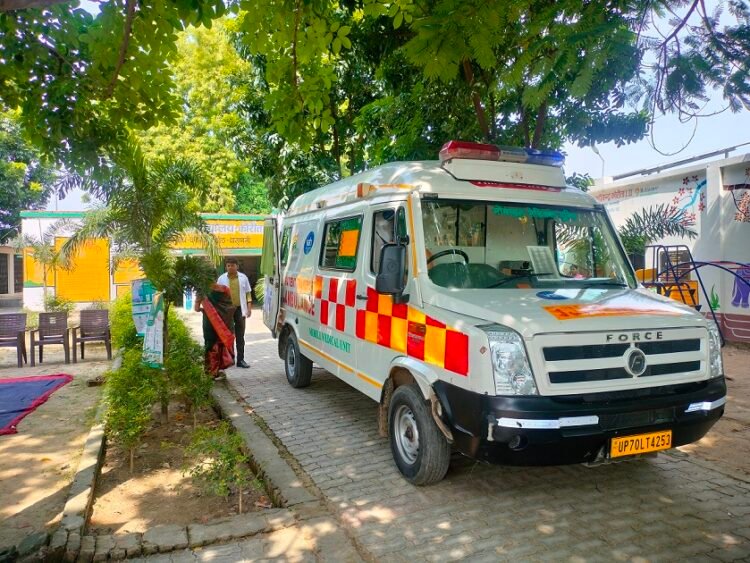ROADIS, through its CSR-driven Swasthya Path initiative, operates Mobile Medical Units (MMUs) across 110 villages in Varanasi, delivering free healthcare, awareness, and referrals to 4.4 lakh people while reducing costs and empowering rural communities.
VARANASI (India CSR): In rural Varanasi, where access to quality healthcare has long been a challenge, ROADIS is driving transformative change through its Swasthya Path initiative. Launched in October 2022, with an additional Mobile Medical Unit (MMU) introduced on October 3, 2024, this Corporate Social Responsibility (CSR) program, implemented with support from The Hans Foundation, is delivering critical healthcare services to underserved communities. Covering 110 villages, 63,646 households, and approximately 444,000 people across five blocks—Kashi Vidyapeeth, Araziline, Baragaon, Chiraigaon, and Pindra—the initiative focuses on awareness, diagnosis, treatment, and referrals. By addressing financial barriers and fostering community trust, ROADIS’ MMUs are reshaping healthcare delivery in rural India, with a special emphasis on innovative menstrual health programs.
A Lifeline for Rural Communities
As part of ROADIS’ CSR outreach, these Mobile Medical Units bring medical services directly to villagers, eliminating the need for costly and time-consuming travel to urban centers. Each unit is staffed with qualified MBBS doctors, nurses, lab technicians, pharmacists, and drivers, providing free consultations, diagnostic tests, medicines, and referrals. Supported by 108 community volunteers and Hans Swasthya Sakhis, the program leverages digital tools like CommCare for efficient patient data tracking. From October 2022 to December 2024, the MMUs treated 139,814 patients, conducted 45,692 lab tests, performed 798 home visits, and facilitated 1,338 referrals, showcasing ROADIS’ commitment to impactful healthcare delivery.
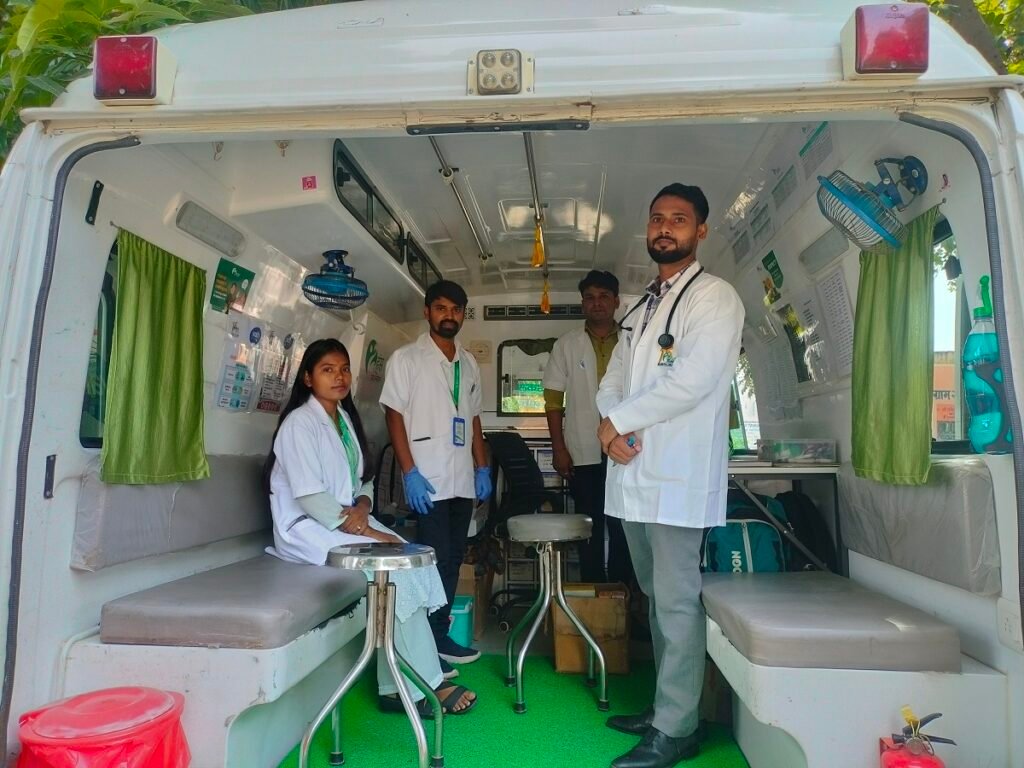
The Four-Pillar Approach: Awareness, Diagnosis, Cure, and Referral
The program follows a four-pillar CSR healthcare model to ensure sustainable healthcare solutions, emphasizing prevention, early intervention, and community empowerment.
1. Raising Awareness Through Community Engagement
With support from The Hans Foundation as the implementing partner, ROADIS conducts extensive health education campaigns. In Phase I, 452 awareness sessions reached 13,476 individuals, and 2,030 community meetings engaged 129,238 people on topics like hygiene, non-communicable diseases (NCDs), and maternal health. In Q1 2025, 63 campaigns reached 1,765 individuals, including events like Dengue Day on June 15, using street plays to educate about vector-borne diseases. These efforts empower communities with knowledge to prevent illnesses and seek timely care.
2. Accurate Diagnosis for Timely Intervention
The MMUs offer on-site diagnostics, conducting 45,692 lab tests in Phase I to identify conditions like hypertension, diabetes, malaria, and dengue. In Q1 2025, outpatient visits averaged 5-6 minutes, with camps screening for critical health issues. Digital tools ensure accurate record-keeping, enabling personalized follow-ups and preventing complications, particularly for below-poverty-line (BPL) families.
3. Effective Treatment with Free Medicines
The MMUs have treated 139,814 patients in Phase I, with 17,338 in Q1 2025, providing free medicines after rigorous audits to minimize wastage. The program addresses a wide range of conditions, from common ailments to chronic diseases, and includes specialized camps for orthopedic, dental, skin, and gynecological care. This comprehensive approach ensures high patient satisfaction and improved health outcomes.
4. Seamless Referrals to Higher Care
For complex cases, ROADIS facilitates referrals to public health facilities, with 1,338 patients referred in Phase I and 256 in Q1 2025. By coordinating with higher-level centers, ROADIS ensures continuity of care, addressing severe NCDs and pregnancy complications effectively.
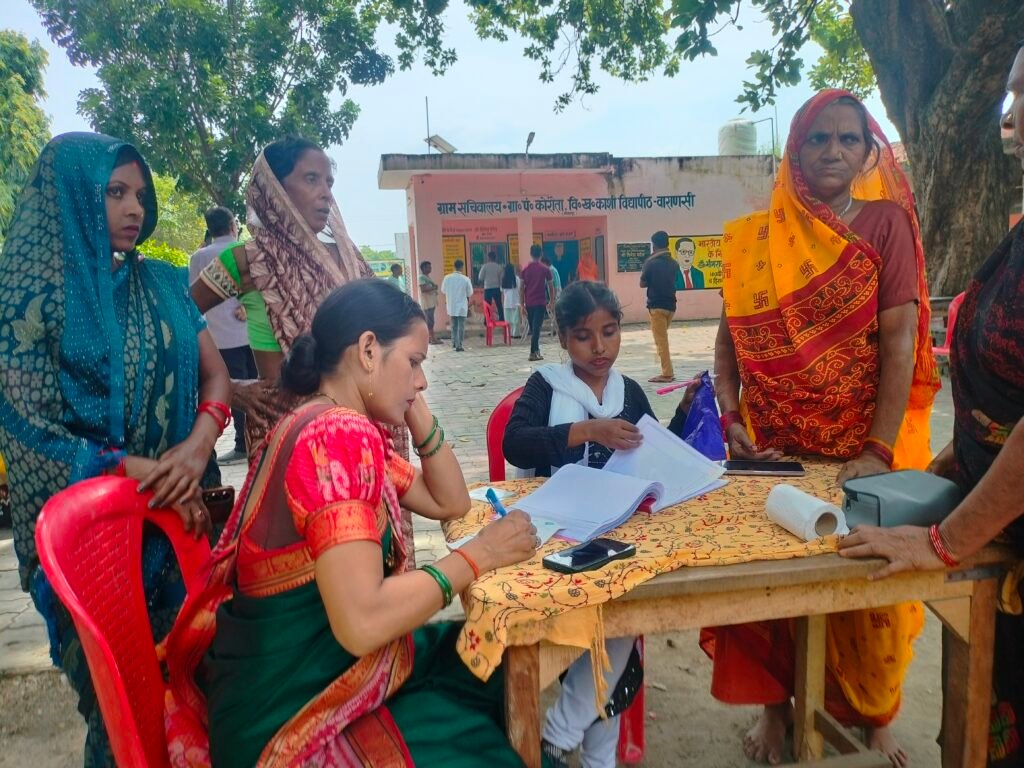
Addressing Diverse Health Needs
The MMUs provide holistic care, covering NCDs, communicable diseases, maternal and child health, pathology, oral health, ophthalmology, ENT, and dermatology. Specialist camps address specific needs, such as eye care and school health, while seasonal campaigns tackle diseases like malaria and dengue. This comprehensive approach ensures that diverse community health needs are met effectively.
Transforming Menstrual Health Practices
This flagship CSR intervention on menstrual health has empowered adolescent girls. In Phase I, 300 girls’ groups were formed, with plans for 440 additional groups in FY 2025-26. With the Hans Foundation’s support, ROADIS conducts surveys, awareness sessions, and myth-busting campaigns on hygiene, nutrition, and cramp management. Sanitary kits, including pads, heating bottles, and educational booklets, are distributed, leading to a rise in sanitary pad usage from 62% to 97%, school attendance during menstruation from 74% to 90%, and an 85% improvement in health practices. Menstrual hygiene awareness has grown by 82%, and dietary choices have improved by 77%, empowering girls to manage their periods confidently.
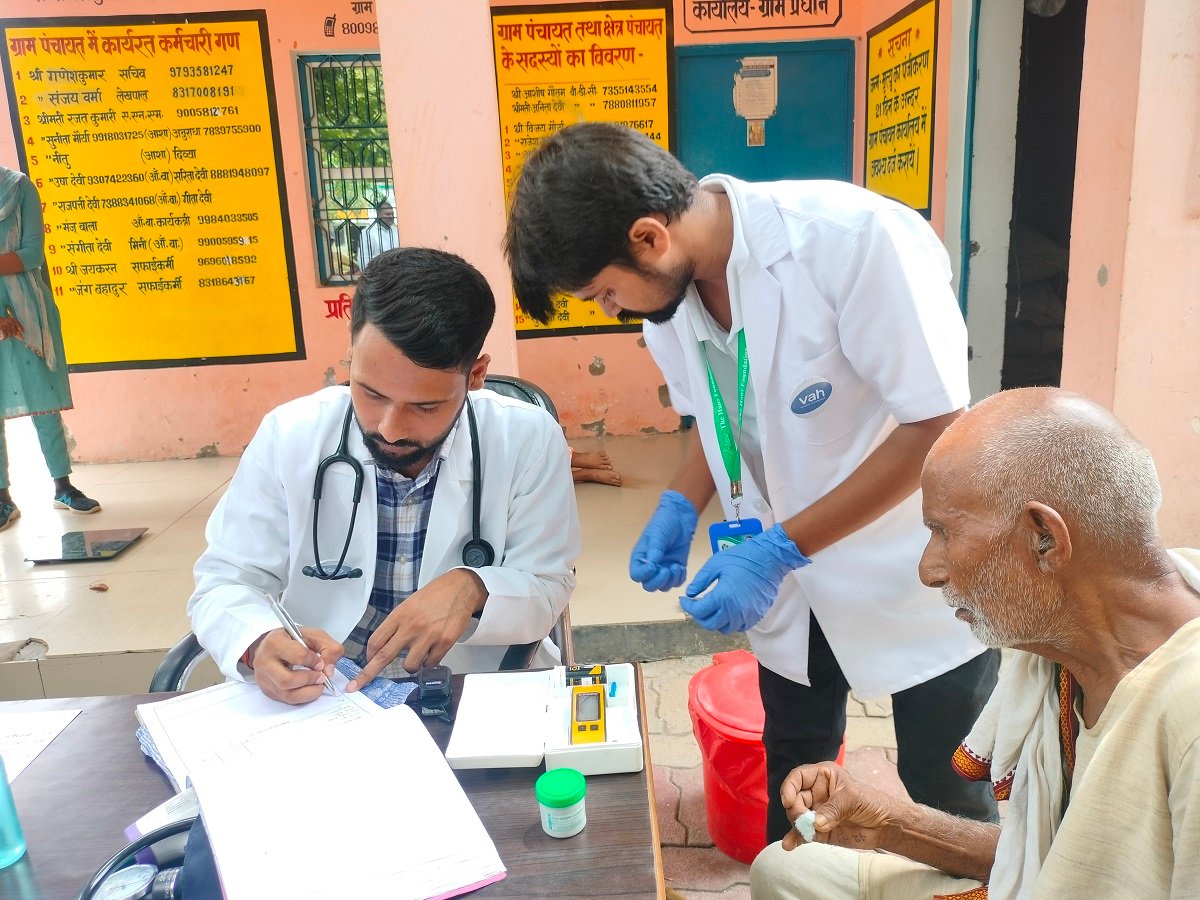
Economic and Social Impact
The MMUs have significantly reduced the financial burden on rural families. Average monthly medical expenses dropped by 58%, from Rs. 4,545 to Rs. 1,899, making healthcare more affordable for BPL households. By preventing high-cost treatments through early diagnosis and intervention, the program alleviates the economic toll of illness, which often forces families into debt. Additionally, the lower infrastructure costs of MMUs compared to static health centers make them a cost-effective solution for scaling healthcare access. The program’s integration with government schemes further enhances its impact, connecting communities to benefits like nutrition kits for pregnant women and anemia management programs.
Challenges and Future Directions
Despite their success, MMUs face challenges like infrastructure deficits and a shortage of trained medical professionals in rural areas. To address these, the program is expanding its volunteer network and leveraging technology for better data management and outreach. Plans for FY 2025-26 include increasing the number of menstrual health groups and conducting more specialist camps to address specific health concerns. By continuing to adapt to community needs and collaborating with public-private partnerships, MMUs aim to sustain their impact and reach even more underserved populations.
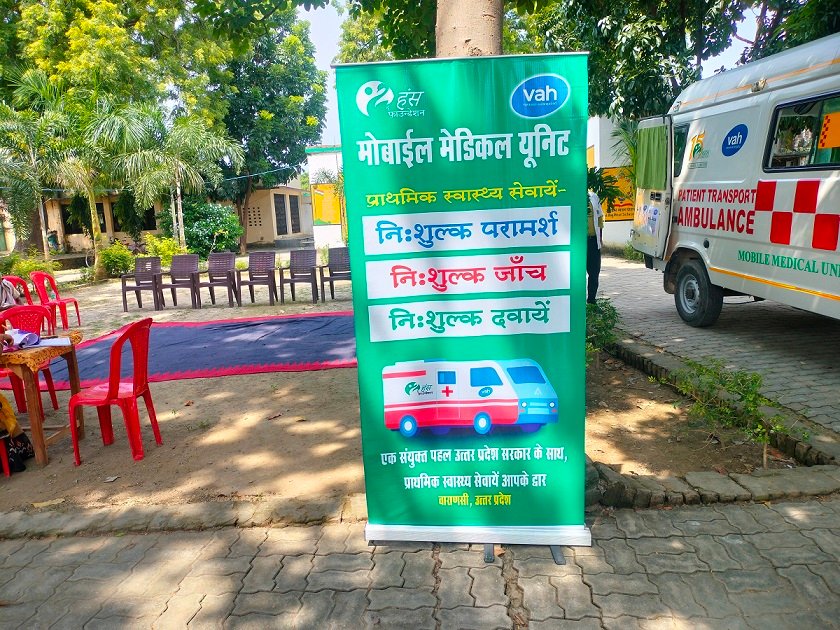
Eduardo Calvo: Bringing Healthcare to Rural India with ROADIS
Eduardo Calvo, Global Communications and Corporate Responsibility Director for ROADIS, said, “He is deeply passionate about the Mobile Medical Unit (MMU) project, a CSR initiative launched in Varanasi to address healthcare accessibility in rural communities. Initiated in October 2022, with an additional unit added in October 2024, the project aligns ROADIS’ infrastructure development with community health needs. Calvo highlights the enthusiastic community response, driven by the project’s focus on awareness, diagnosis, treatment, and referrals. Despite initial challenges like rural superstitions, effective communication and professional medical staff, including doctors, nurses, and technicians, have built trust, ensuring acceptance. The program has expanded annually, with five MMUs now covering 22 villages each, aiming to increase impact and beneficiaries. Calvo emphasizes the link between mobility, infrastructure, and health, viewing the MMUs as a vital tool for fostering healthier communities while overcoming barriers through education and professional care.”
Ena Chakravorty on ROADIS’ Swasthya Path Initiative in Rural Varanasi
Ena Chakravorty, Communication and CSR Director – India, ROADIS, sharing a deeper view into the program said, “The program was launched in 2022 to address the healthcare gaps in rural Varanasi. A baseline survey revealed challenges like distant primary health centers (PHCs), cultural barriers preventing women from seeking care independently, and financial burdens on daily-wage earners like farmers and laborers. To bridge these gaps, ROADIS started with four Mobile Medical Units (MMUs) in 2022, covering 80-88 villages across four blocks, treating 70-80,000 people annually. Following the success, a fifth MMU was added in November 2024, expanding coverage to 110 villages across five blocks, serving over 100,000 people. Each MMU, staffed by an MBBS doctor, nurse, lab technician, pharmacist, and driver. The MMUs visits two villages daily, offering free services including 40 rapid blood tests, prescriptions, and medicines. The initiative also focuses on awareness, addressing health-seeking behavior through campaigns on menstrual hygiene, breastfeeding, pre/postnatal care, hypertension, diabetes, malaria, dengue, and nutrition. Nutritional packages are distributed to combat deficiencies, particularly in rural areas. Supported by district officials, Swasthya Path Initiative ensures accessible, cost-free healthcare, significantly improving health outcomes and community well-being.”
Dinesh Pradhan Hails MMUs in Varanasi
Dinesh Kumar, Village Sarpanch, Korota said, “Praises the Mobile Medical Units (MMUs) for transforming healthcare in not just his village but neighbouring villages as well. As most residents are farmers, they are unable to afford travel costs—often Rs. 4-5 per trip to distant clinics—the MMUs provide free on-site checkups and medicines, eliminating financial barriers. Crowds gather from 8-9 AM daily, eagerly awaiting the doctor’s arrival, highlighting the program’s reliability and community trust. Serving his village of about 20,000 people, plus a neighboring one of 5,000 and even other neighbouring village residents, the central health facility ensures accessible care. He emphasized its vital role in supporting those unable to seek external treatment, fostering better health outcomes.”
MMUs Bringing Healthcare to Rural Varanasi
Ajay Kumar from The Hans Foundation said, “He coordinates the Mobile Medical Units (MMUs) in Varanasi, a collaborative effort with ROADIS launched in 2022. Initially aimed at addressing healthcare gaps in rural areas like Akanshi village, the program built trust by engaging with local leaders such as PRI members, Anganwadi workers, and ASHA volunteers. The MMUs provide basic primary healthcare, focusing on family-level care rather than critical treatments, with referrals to government facilities for complex cases like diabetes or emergencies. Kumar notes that the units are staffed by qualified doctors from government colleges, ensuring reliable care. Community response has been positive, particularly among women, who gain awareness about emergency health measures, including during pregnancy. To maintain medicine availability, the MMUs use a systematic indent process, raising requests monthly and maintaining a 15-day stock buffer, preventing shortages (e.g., ensuring sufficient Paracetamol supplies). By fostering government collaboration and community bonding, the initiative has effectively addressed local healthcare needs, offering free consultations, tests, and medicines, while empowering villagers through education and accessible care.”
A Model for Equitable Healthcare
ROADIS’s Swasthya Path initiative is a CSR-driven model for equitable healthcare delivery. By combining awareness, diagnosis, treatment, and referrals with community engagement, ROADIS is transforming lives in rural Varanasi. Its awareness program on menstrual health, in particular, empowers young girls, breaking down barriers to education and well-being. As the initiative evolves, it offers a scalable CSR framework for addressing healthcare disparities across India.
(Copyright@IndiaCSR)
ALSO READ | ROADIS’ CSR Initiative: Transforming Children’s Lives Through Education
Also Read in Hindi | CSR: ROADIS स्वास्थय पथ MMUs द्वारा वाराणसी ग्रामीण क्षेत्र के 4.4 लाख लोग लाभान्वित

